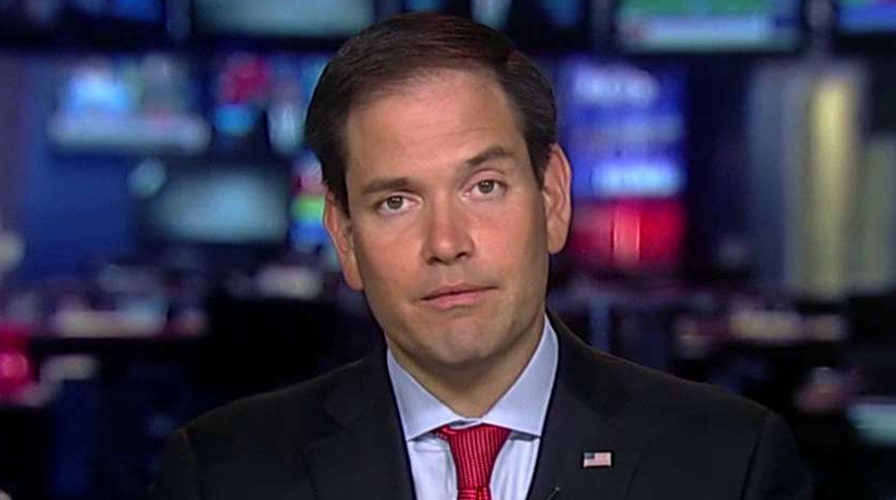Rubio: State Department should bar Clinton clearances
Former presidential candidate reacts to the FBI's findings, Afghan troop announcement
Florida Republican Sen. Marco Rubio is accusing the Obama administration of trying to "deceive" Congress and the American people about roughly $1.7 billion in payments to Iran -- suggesting at least some of the money was a "ransom" for American hostages and demanding official documents for the related transactions.
“Each day brings new revelations about your administration’s efforts to deceive Congress and the American people regarding payments of billions of dollars to the world’s foremost state sponsor of terrorism,” Rubio wrote Saturday in a letter to President Obama. “The America people do not believe the story that your administration did not provide Iran an illicit and potentially illegal ransom payment.”
The administration in January announced an agreement between the U.S. and Iran to settle a failed, decades-old arms deal that included Washington returning to Tehran $400 million and an additional $1.3 billion in interest.
However, reports in early August revealed the initial $400 million was delivered on Jan. 17 -- the same day Tehran agreed to release four American prisoners. And Republicans are calling it a ransom.
At least some of the money was in foreign currency, and a video originating on Iranian TV purports to show bundles of the cash on pallets.
The letter from Rubio -- a failed 2016 presidential candidate now in a tough race for a second Senate term -- came two days after administration officials told House Republicans that Iran wanted "immediate access" to the $1.7 billion paid by the United States in cash.
Rubio submitted a list of nine demands in the letter, including a request for a copy of a waiver allowing the use of cash, instead of complying with a U.S. code that states “all federal payments made by an agency shall be made by electronic transfer.”
Rubio also wants to know why the administration didn’t issue a check, which he says is the required method when a transfer is inappropriate, according to another U.S. code.
“Iran has pocketed this money and continued to hold and take more American hostages,” Rubio also wrote. “It has likely used this foreign currency to fund its military including its ballistic missile programs and to support Iran's terrorist proxies throughout the Middle East.”
Though the administration has claimed the payment and the prisoner release were separate incidents, it recently acknowledged the cash was used as leverage until the Americans were allowed to leave Iran.
State and Justice officials at the hearing Thursday defended the payment and its cash delivery.
Christopher Backemeyer, a deputy assistant secretary of state, said Iran wanted immediate access to the money, but he said he wasn't aware whether Iran had asked for cash. He said it was his understanding that the money was going to "critical economic needs" in Iran.
The Associated Press contributed to this report.





